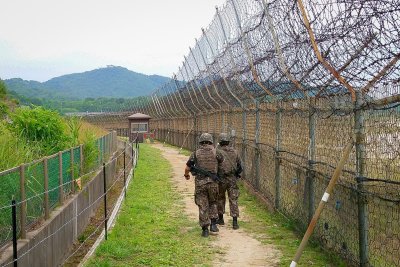Standoff over masked agents fuels the latest partial government shutdown
WASHINGTON — A dispute over whether federal immigration agents should be allowed to wear masks during enforcement operations has become one of the biggest obstacles to keeping the Department of Homeland Security funded, pushing the government toward a partial shutdown early Saturday.
Democrats have described the practice as corrosive to public trust, arguing that masked agents create the appearance of a “secret police” force. Republican lawmakers, President Trump and his top advisors, meanwhile, have drawn a hard line against requiring officers to remove their face coverings, insisting that doing so would expose them to harassment, threats and online doxxing.
“They want our law enforcement to be totally vulnerable and put them in a lot of danger,” Trump said at a White House event Thursday. He added that it would be “very, very hard to approve” Democrats’ demands, such as unmasking federal officers.
The standoff over masking stalled negotiations as lawmakers raced to meet a funding deadline for the Department of Homeland Security at midnight Friday. Without a deal, key agency functions — from airport security to disaster relief coordination — could be affected if the shutdown drags on.

Sen. Ruben Gallego (D-Ariz.) rides the Senate subway Thursday ahead of the latest partial government shutdown.
(Graeme Sloan / Bloomberg via Getty Images)
As with every shutdown, the agency’s essential functions will continue to operate, Tricia McLaughlin, assistant Homeland Security secretary for public affairs, said in a statement. But employees performing those functions at agencies such as the Federal Emergency Management Agency, the Coast Guard, and the Transportation Security Administration could go without pay if the shutdown stretches for weeks.
The heads of those agencies told the House Homeland Security Appropriations Subcommittee on Wednesday that the shutdown is expected to create severe and lasting challenges.
Vice Adm. Thomas Allan, the acting vice commandant of the Coast Guard, said a shutdown would delay maintenance for boats and aircraft, and halt pay for 56,000 active-duty reserve and civilian personnel. Ha Nguyen McNeill, acting administrator of TSA, recounted how the last government shutdown affected her workers and spiked wait times at airports.
“We heard reports of officers sleeping in their cars at airports to save money on gas, selling their blood and plasma and taking on second jobs to make ends meet,” she said, adding that some are still recovering from the financial impact.
Operations within U.S. Immigration and Customs Enforcement and Customs and Border Protection — the agencies that are central to the budget impasse — are likely to be the least affected. That’s because both agencies still have access to $75 billion in funding approved last year as part of Trump’s “big, beautiful bill.”
By midday Friday, it remained unclear when the partial shutdown would end, as lawmakers left Washington for a security conference in Munich and progress between Democratic and White House negotiators remained nebulous.
“We’ll see what happens,” Trump told reporters on Friday when asked about cutting a deal. “We always have to protect our law enforcement.”
The partial government shutdown comes at a moment of acute public anger at the agency’s approach to immigration enforcement, which has included the fatal shootings of two U.S. citizens, Renee Good and Alex Pretti, in Minneapolis.
Since the shootings, the Trump administration has tried to quell tensions. Border policy advisor Tom Homan said Thursday that the administration was ending its immigration crackdown in Minneapolis. Homeland Security Secretary Kristi Noem announced earlier this month that the agency would be acquiring and issuing body cameras to federal agents. Trump also said he wants to employ a “softer touch” to immigration enforcement after the killings of Good and Pretti.
But Democrats maintain that they need reforms written into law. Among their demands is requiring officers to wear and turn on body cameras, banning them from wearing masks, and ending the practice of “roving patrols” and instead requiring that they carry out only targeted operations.
“We will not support an extension of the status quo, a status quo that permits masked secret police to barge into people’s homes without warrants, no guardrails and zero oversight from independent authorities,” Senate Minority Leader Chuck Schumer said on the Senate floor Thursday.
Todd M. Lyons, the acting director of ICE, told a Senate panel Thursday that he does not want to see federal agents masked either, but said he is hesitant to bar face coverings because the threats to agents are too severe.
“I would work with this committee and any committee to work with holding individuals accountable that doxx ICE agents, because ICE agents don’t want to be masked,” Lyons said. “They’re honorable men and women, but the threats against their family are real.”
Federal immigration officials are more supportive of body cameras.
U.S. Customs and Border Protection Commissioner Rodney Scott told a House committee on Tuesday that he supports expanding the use of body cameras, but said more funding is needed to hire personnel to oversee the rollout.
“Fund the entire program so that we can be transparent and that we can make sure America knows what we’re doing, because that trust is critically important,” he said.
Ben Johnson, executive director of the American Immigration Lawyers Assn., said that while the White House has made some “tweaks around oversight,” its actions continue to fall short.
The association, which represents 18,000 immigration attorneys, has urged Congress to refuse more funding for ICE and CBP before implementing reforms.
“The American public wants and deserves real, meaningful guardrails that are written into law that ensure this administration — and, quite frankly, any administration — will abide by the Constitution and respect fundamental principles of due process,” Johnson said Wednesday on a call with reporters.
“Congress has a critical opportunity right now to meet that demand,” he added.

Republican Sens. James Lankford of Oklahoma, Ron Johnson of Wisconsin and Rand Paul of Kentucky talk during a hearing Thursday on oversight of federal immigration agencies.
(Tom Williams / CQ-Roll Call via Getty Images)
So far, Democrats maintain they will continue to bock funding bills without accountability measures in place.
California’s two Democratic U.S. senators, Adam Schiff and Alex Padilla, were among the Senate Democrats who helped block passage of funding bills Thursday that would have averted a shutdown because they lacked accountability measures.
“I will not support more funding for ICE until there are new guardrails to rein in its lawless conduct,” Schiff wrote on X. “I’m a no on anything but real reform.”
Padilla said he would be a “firm no” until lawmakers agree that federal immigration officers need to be held accountable.
“Donald Trump and Republicans want Americans to forget about their lawless immigration roundup, but we won’t,” Padilla said.




